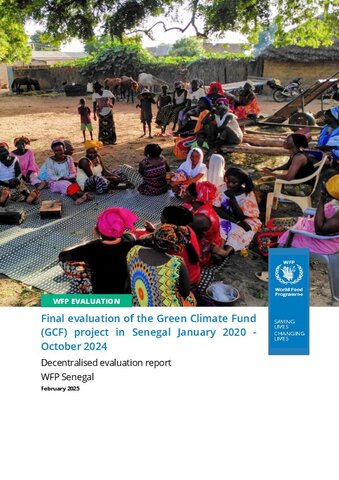
The project aimed to support 405,000 direct beneficiaries across five regions of Senegal - Kolda, Tambacounda, Kaffrine, Fatick and Kaolack - through four integrated components: risk reduction through the creation of climate adaptation assets (Component 1), risk transfer through agricultural insurance (Component 2), risk reserves and prudent risk-taking through the support of village savings and loan groups and the investment in income generating activities (Component 3) and support for the government in managing climate risks (Component 4). By the end of the project, interventions had reached 438,291 direct beneficiaries, exceeding its original target by 33,291 people.
The evaluation, conducted between July 2024 to February 2025, was commissioned at project's conclusion to answer the following overarching questions:
1. To what extent was the R4 project relevant, coherent, and aligned with national policies, WFP strategies, GCF priorities, and the needs of targeted communities?
2. How effectively and efficiently were the project components implemented, and what factors affected delivery and results?
3. What tangible impacts did the project have on household resilience, food security, economic empowerment, and environmental sustainability in the targeted regions?
4.To what extent did the project promote gender equality and social inclusion, particularly for women, youth, and people with disabilities?
5. How sustainable and scalable are the results and mechanisms introduced by the project, particularly in terms of government ownership, institutional anchoring, and community structures?
Key evaluation findings include:
Relevance & Coherence: The project aligns well with national policies, WFP strategies, and GCF priorities. Its integrated, household-based and gender-sensitive approach was relevant to community needs.
Efficiency: Despite positive impacts (e.g. increased food security, savings, and insurance uptake), delays in fund transfers, weak monitoring systems, and high staff turnover hindered smooth implementation.
Impact & Innovation: The project strengthened social cohesion, economic resilience, and natural resource management. Innovations include hybrid agricultural insurance, multi-language climate information, and savings groups.
Gender & Inclusion: Women were actively involved, especially in savings groups, but had limited access to unsubsidised insurance. Youth and persons with disabilities were insufficiently targeted.
Sustainability: Community structures show promise, but institutional anchoring and understanding of insurance remain weak. Sustainability may be compromised without better government involvement and budgeting.
The evaluation made the following recommendations :
R1: Improve knowledge management, make the most of the experience and evidence generated and share expertise in integrated climate risk management.
R2: Scale-up the project in new areas of Senegal.
R3: Refine the R4 model to make it more responsive to ambitions for change.
R4: Replicate the R4 project in new countries.
R5: Strengthen the quality of partnerships, reinforce their strategic and operational capacities and anticipate the sustainability of interventions.
R6: Improve the quality of the M&E system by integrating tools that facilitate project management and are linked to national systems.
R7: Strengthen the integration of gender and inclusion issues to maximise the project's impact
